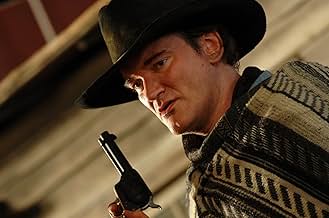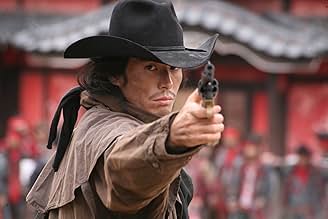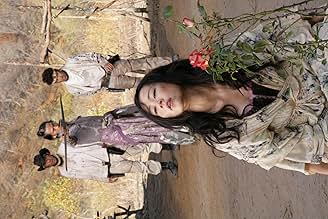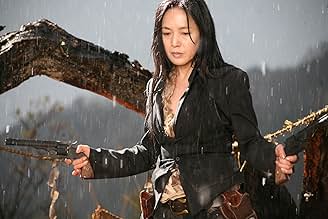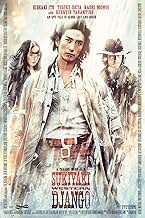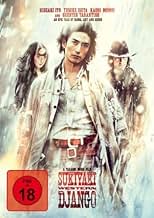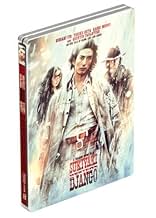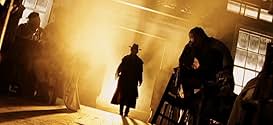IMDb-BEWERTUNG
6,1/10
16.107
IHRE BEWERTUNG
Ein namenloser Revolverheld kommt in eine Stadt, die von rivalisierenden Gangs zerrissen wird, und wählt seinen eigenen Weg, obwohl er von beiden umworben wird.Ein namenloser Revolverheld kommt in eine Stadt, die von rivalisierenden Gangs zerrissen wird, und wählt seinen eigenen Weg, obwohl er von beiden umworben wird.Ein namenloser Revolverheld kommt in eine Stadt, die von rivalisierenden Gangs zerrissen wird, und wählt seinen eigenen Weg, obwohl er von beiden umworben wird.
- Regie
- Drehbuch
- Hauptbesetzung
- Auszeichnungen
- 4 Gewinne & 5 Nominierungen insgesamt
Empfohlene Bewertungen
Sukiyaki Western Django essentially takes Kurosawa's Yojimbo (forrunner to the spaghetti Western) and make it into an exploitation film. I guess it's no wonder then that Quentin Tarantino would be drawn to such a film. In this hybrid flick, scene one features Tarantino taking on three Japanese gun slingers in what intentionally look like a b-movie set piece of the desert. (The sun distinctly hangs from a wire, ha ha). With this scene, the movie will either have your full attention, or it will have you making for the exit, but it's a good indicator that something eccentric is going to follow.
It is for the best that Sukiyaki Western Django does not take itself seriously. Despite being Tarantino's cup of tea, somehow he feels out of place. It is not because he is the only American on screen, but rather because the overwrought performance quality of everyone else actually make him look talented. His satire is more subtle, while everyone else acts like they are in a Kabuki theatre production.
The original Yojimbo, didn't actually have much of a plot, but by stretching it out, Kurosawa was able to give it a more solid body, something which unfortunately is not duplicated here. Sukiyaki Western Django is short and superficial, not giving the audience much of a chance to grow into the characters. This is one of those movies that makes you wanna laugh at the people on screen. You don't end up caring who lives or dies, but the fashion in which they do so is effectively entertaining.
The gun play in this movie is the product of artistic creativity and visual humour, with a bit of slapstick. Watching a kataka split a speeding bullet in two (in slow motion) is far more pleasurable than obnoxious. Even some of the more aesthetically romantic qualities of the movie are funny. In the climax, it starts to snow (in very Asian cinematic fashion) covering the ground white in five seconds, I was laughing. Sometimes when people gets shot, feathers gets spilled in the place of blood. Who would have thought that up?
What Sukiyaki Western Django needs more than anything is a better substance to go with the style. This film, which is superficially amusing, can be equally annoying sometimes on account of scrappy dialogue and acting. It is reasonably effective for it's genre, but there are better examples which I would recommend before this
It is for the best that Sukiyaki Western Django does not take itself seriously. Despite being Tarantino's cup of tea, somehow he feels out of place. It is not because he is the only American on screen, but rather because the overwrought performance quality of everyone else actually make him look talented. His satire is more subtle, while everyone else acts like they are in a Kabuki theatre production.
The original Yojimbo, didn't actually have much of a plot, but by stretching it out, Kurosawa was able to give it a more solid body, something which unfortunately is not duplicated here. Sukiyaki Western Django is short and superficial, not giving the audience much of a chance to grow into the characters. This is one of those movies that makes you wanna laugh at the people on screen. You don't end up caring who lives or dies, but the fashion in which they do so is effectively entertaining.
The gun play in this movie is the product of artistic creativity and visual humour, with a bit of slapstick. Watching a kataka split a speeding bullet in two (in slow motion) is far more pleasurable than obnoxious. Even some of the more aesthetically romantic qualities of the movie are funny. In the climax, it starts to snow (in very Asian cinematic fashion) covering the ground white in five seconds, I was laughing. Sometimes when people gets shot, feathers gets spilled in the place of blood. Who would have thought that up?
What Sukiyaki Western Django needs more than anything is a better substance to go with the style. This film, which is superficially amusing, can be equally annoying sometimes on account of scrappy dialogue and acting. It is reasonably effective for it's genre, but there are better examples which I would recommend before this
Reading some of the reviews, I am surprise that others are confused as to the story. It is basically a samurai movie made as a Japanese western with Japanese cowboys instead of samurais. The story is almost the same as Yojimbo/A Fistfull of dollars. Stranger comes into town and gets the 2 opposing gangs to start killing each other. The difference being he has a sidekick in the kick ass Bloody Benten (female gunslinger). I think what makes everyone go "huh?" is its rather confusing opening with Quentin Tarantino and also the dialogue in heavily Japanese accented and enunciated English. It is rather jarring and does distract from the story. However if you have watched enough undubbed samurai movies you will be familiar with the style and delivery of the dialogue so the distraction goes away. The movie is nothing original but based on it simply being a gunfight movie its not bad.
If you've seen "High Plains Drifter", "The Good, The Bad and The Ugly" any other Leone films or "spaghetti westerns" you will appreciate this film. (I guess this is an "udon western"? Sorry, I had to throw that in there.) For those who have not, you may not understand why the film goes to such extremes throughout the scene sequences. Everything from the bumbling sheriff to the mindless and spineless random gang characters as well as the leader of the 'reds', offer comedic escapades that are quite hysterical. Then we swing to the very dramatic and tragic scenes of loss, murder, pillaging and revenge. Japanese themes and references are inherent because the director is well...Japanese! The dialogue is all English and purposely so. I'm not sure if this was for comedic reasons or to reach out to a larger audience, but it is effective and an interesting choice on Miike's part. It is subtitled which, depending on how you view it, either detracts or adds to the film. It does help in some cases, but in my opinion, I think it would have been better to leave it out altogether. Overall, its a very fun film but expect to be taken up and down emotionally. Production, cinematography, scenery, costumes, art direction and sound design aren't even worth mentioning because they're all done so well, you don't notice them. Its about as close as you can get to a Western-Samurai Japanese-Western!
Sukiyaki Western Django (2007)
** (out of 4)
Quentin Tarantino in a Takashi Miike homage to Spaghetti Westerns is going to be enough to get a few curious people to watch but I must rip off a few reviews I've read, which called this film different but not very entertaining. In what's basically a remake of Akira Kurosawa's Yojimbo, a mysterious gunfighter (Ito Hideaki) with no name shows up and plays two rival gangs against one another. If someone was to call this the greatest movie ever made I honestly wouldn't argue with them. I'm sure many are going to watch this film and consider it a masterpiece and I would respect their opinion just about as much as I respect Miike for trying something like this. However, the movie just didn't work for me. This is basically an incredibly bizarre homage to countless Westerns done in a way that Tarantino pays homage to various genres in this country but I might go a step further and say Miike is much more original than Tarantino has ever been. I think this film, for what it is, is incredibly original and at times visually brilliant but as much credit as I give to Miike I have to give him just as much blame. For some reason he felt it would be a good idea to have the Japanese actors speak English, which was a deadly mistake. Sure, this adds a surreal nature to the film but the problem is that a lot of the times you can't understand what they're saying. This film is full of dialogue and when you can't understand a quarter of it then you're going to be in trouble. This also effects the performances as the spoken dialogue is just as bad as watching a dubbed Kurosawa film. As is to be expected, the movie is full of violence but most of it is done in a comical way and that includes one man getting shot up while his wife holds his dying body. Tarantino doesn't add too much to the film either. In the end this is a film I highly respect but there's just no way I will ever find myself watching it again.
** (out of 4)
Quentin Tarantino in a Takashi Miike homage to Spaghetti Westerns is going to be enough to get a few curious people to watch but I must rip off a few reviews I've read, which called this film different but not very entertaining. In what's basically a remake of Akira Kurosawa's Yojimbo, a mysterious gunfighter (Ito Hideaki) with no name shows up and plays two rival gangs against one another. If someone was to call this the greatest movie ever made I honestly wouldn't argue with them. I'm sure many are going to watch this film and consider it a masterpiece and I would respect their opinion just about as much as I respect Miike for trying something like this. However, the movie just didn't work for me. This is basically an incredibly bizarre homage to countless Westerns done in a way that Tarantino pays homage to various genres in this country but I might go a step further and say Miike is much more original than Tarantino has ever been. I think this film, for what it is, is incredibly original and at times visually brilliant but as much credit as I give to Miike I have to give him just as much blame. For some reason he felt it would be a good idea to have the Japanese actors speak English, which was a deadly mistake. Sure, this adds a surreal nature to the film but the problem is that a lot of the times you can't understand what they're saying. This film is full of dialogue and when you can't understand a quarter of it then you're going to be in trouble. This also effects the performances as the spoken dialogue is just as bad as watching a dubbed Kurosawa film. As is to be expected, the movie is full of violence but most of it is done in a comical way and that includes one man getting shot up while his wife holds his dying body. Tarantino doesn't add too much to the film either. In the end this is a film I highly respect but there's just no way I will ever find myself watching it again.
Although it has the deceptive appearance of one and has been championed as such by many reviewers, Sukiyaki is not quite as much a spaghetti western love letter like, say, Alex De La Iglesias' 800 BALAS as it is a typically Miike-ian reinterpretation of the genre that borrows from both chambara and spaghetti western yet subscribes to neither. It's much less a remake or reimagining of Sergio Corbucci's original DJANGO, not a prequel, sequel or in any other way narratively connected to the original or the gazillion unofficial cash-ins small-time Italian producers with dollar signs gleaming in their eyes feverishly churned out in its wake.
What first screams for our attention is the kind of east-meets-west melting pot Miike has prepared for our enjoyment. A signpost on the lone gunman's way reads 'Nevada', the actors speak English with heavy and grating Japanese accents, some of them bear katanas and most others six shooters, the shabby ghost town the movie takes place in is distinctly Japanese in its architecture yet ornamented with dead men hanging from the town gate in typical 'far west' fashion, there's a sheriff, short blurbs about samurais, rumors of hidden treasure and a gold rush explained in a flashback.
However Miike is not attempting what many other directors have tried to in the past, that is to transpose occidental concepts, their mentality or filmic tradition to the oriental or the other way around. This is no RED SUN, EAST MEETS WEST, THE MASTER GUNFIGHTER or A FISTFUL OF DOLLARS to name but a few. What he tries and largely succeeds in creating is this alternative 'far west', a grotesque, exaggerated caricature of the American frontier myth seen through Japanese eyes.
A seamless melding of western and chambara that takes place in a distinctly imagined location. In Miike's vision of the genre west, the (historical naval) battle of Dannoura between the Genji and the Heike takes place close to Quentin Tarantino dressed in a poncho playing a gunfighter called Ringo and is followed a couple hundred years later by a signpost that reads Nevada and the Genji and Heike still split into warring factions. If a country had to be named as the setting for Sukiyaki it would be the United States of Nippon in Sukiyaki's universe, there never was any Japan or America to begin with. A sort of RETCON or 'Retroactive Continuity' as it is known is taking place here. Fans of comic books will be familiar with the myth-making idea here.
It's a damn shame then that a movie as conceptually and aesthetically ambitious as Sukiyaki is let down by a terrible script, Miike's ill-advised decision to have all his actors mumble their way through their lines in distracting Engrish and the pace-clogging inclusion of at least thirty minutes of dead running time that should have been mercifully left to die at the cutting room floor.
There are scenes that don't work at all (such as the unnecessary dance scene) and there are scenes that outstay their welcome by a good number of minutes. And they're all strung together in a painfully mediocre pastiche of a script carrying with it a confused and incongruous mood that can't decide whether it wants to be taken serious, laughed at or laughed with. Quasi-philosophical blurbs are married with ill-advised slapstick nonsense, fortune cookie nuggets of wisdom with lame flashbacks and cartoon-esquire action. There's something for everyone here and everything pushing in different directions at once. On one hand Miike seems to go for an air of sentimental and meaningful profundity while at the same time indulging his nuttier side.
The good in Sukiyaki come in the form of a commendable visual attention to detail and beautiful lighting, the blistering action and the comic book vibe he goes for that recalls the days of FUDOH and DEAD OR ALIVE. While not without the macabre touches we've come to expect from him, Sukiyaki is a decidedly commercial action picture, one that will ironically appeal more to Tarantino and Rodriguez fans than devoted spaghetti western or chambara afficionados.
Perhaps emphasizing that last part, Tarantino has a short role as gunfighter extraordinaire Ringo. In the opening scene that supposedly takes place concomitant with the Battle of Dannoura he whacks pistolero-style three badly dressed goons and mouths off a couple of one-liners.
The scene is amusing at best but he has the show stole from right under his nose by the beautiful and intriguing set design and painted backdrops that recreate an oddly poetic and intentionally artificial rendition of the old west, perhaps recalling the dream sequence Akira Kurosawa created for Tatsuya Nakadai to stagger his way through in KAGEMUSHA or the similarly evocative painted sunsets of DODESUKADEN. I wish Miike had returned to that technique again later in the movie. Instead he uses a short anime passage that recalls KILL BILL. The final showdown in the snow is among the highlights of the movie and so is the appearance of a certain coffin and its contents that will have DJANGO fans nodding in approval.
What first screams for our attention is the kind of east-meets-west melting pot Miike has prepared for our enjoyment. A signpost on the lone gunman's way reads 'Nevada', the actors speak English with heavy and grating Japanese accents, some of them bear katanas and most others six shooters, the shabby ghost town the movie takes place in is distinctly Japanese in its architecture yet ornamented with dead men hanging from the town gate in typical 'far west' fashion, there's a sheriff, short blurbs about samurais, rumors of hidden treasure and a gold rush explained in a flashback.
However Miike is not attempting what many other directors have tried to in the past, that is to transpose occidental concepts, their mentality or filmic tradition to the oriental or the other way around. This is no RED SUN, EAST MEETS WEST, THE MASTER GUNFIGHTER or A FISTFUL OF DOLLARS to name but a few. What he tries and largely succeeds in creating is this alternative 'far west', a grotesque, exaggerated caricature of the American frontier myth seen through Japanese eyes.
A seamless melding of western and chambara that takes place in a distinctly imagined location. In Miike's vision of the genre west, the (historical naval) battle of Dannoura between the Genji and the Heike takes place close to Quentin Tarantino dressed in a poncho playing a gunfighter called Ringo and is followed a couple hundred years later by a signpost that reads Nevada and the Genji and Heike still split into warring factions. If a country had to be named as the setting for Sukiyaki it would be the United States of Nippon in Sukiyaki's universe, there never was any Japan or America to begin with. A sort of RETCON or 'Retroactive Continuity' as it is known is taking place here. Fans of comic books will be familiar with the myth-making idea here.
It's a damn shame then that a movie as conceptually and aesthetically ambitious as Sukiyaki is let down by a terrible script, Miike's ill-advised decision to have all his actors mumble their way through their lines in distracting Engrish and the pace-clogging inclusion of at least thirty minutes of dead running time that should have been mercifully left to die at the cutting room floor.
There are scenes that don't work at all (such as the unnecessary dance scene) and there are scenes that outstay their welcome by a good number of minutes. And they're all strung together in a painfully mediocre pastiche of a script carrying with it a confused and incongruous mood that can't decide whether it wants to be taken serious, laughed at or laughed with. Quasi-philosophical blurbs are married with ill-advised slapstick nonsense, fortune cookie nuggets of wisdom with lame flashbacks and cartoon-esquire action. There's something for everyone here and everything pushing in different directions at once. On one hand Miike seems to go for an air of sentimental and meaningful profundity while at the same time indulging his nuttier side.
The good in Sukiyaki come in the form of a commendable visual attention to detail and beautiful lighting, the blistering action and the comic book vibe he goes for that recalls the days of FUDOH and DEAD OR ALIVE. While not without the macabre touches we've come to expect from him, Sukiyaki is a decidedly commercial action picture, one that will ironically appeal more to Tarantino and Rodriguez fans than devoted spaghetti western or chambara afficionados.
Perhaps emphasizing that last part, Tarantino has a short role as gunfighter extraordinaire Ringo. In the opening scene that supposedly takes place concomitant with the Battle of Dannoura he whacks pistolero-style three badly dressed goons and mouths off a couple of one-liners.
The scene is amusing at best but he has the show stole from right under his nose by the beautiful and intriguing set design and painted backdrops that recreate an oddly poetic and intentionally artificial rendition of the old west, perhaps recalling the dream sequence Akira Kurosawa created for Tatsuya Nakadai to stagger his way through in KAGEMUSHA or the similarly evocative painted sunsets of DODESUKADEN. I wish Miike had returned to that technique again later in the movie. Instead he uses a short anime passage that recalls KILL BILL. The final showdown in the snow is among the highlights of the movie and so is the appearance of a certain coffin and its contents that will have DJANGO fans nodding in approval.
Wusstest du schon
- WissenswertesThe background for the artificial set in the prologue is clearly inspired by the woodblock prints "Gaifu Kaisei" and "Sanka Haku" featured in Hokusai's famous "Thirty Six Views of Mount Fuji" series.
- PatzerIn the final scene, the Gunman goes from having a mustache and goatee to being clean shaven between shots.
- Alternative VersionenThe international cut version, shorter by 23 minutes, omits several scenes for pacing reasons and also all the scenes where the big Genji/Minamoto henchman after having his balls shot off develops a crush for his leader Yoshitsune. This version was screened at several film festivals and is featured on most of the DVD releases outside of Japan.
- VerbindungenReferenced in Film Junk Podcast: Episode 194: Quantum of Solace (2008)
- SoundtracksDjango ~Sasurai~
Performed by Saburô Kitajima
Written by Makoto (as MAKOTO°), Franco Migliacci and Robert Mellin
Composed by Luis Bacalov (as Luis Enrique Bacalov)
Arranged by Eiji Kawamura
Top-Auswahl
Melde dich zum Bewerten an und greife auf die Watchlist für personalisierte Empfehlungen zu.
Details
Box Office
- Budget
- 3.800.000 $ (geschätzt)
- Bruttoertrag in den USA und Kanada
- 50.659 $
- Eröffnungswochenende in den USA und in Kanada
- 9.856 $
- 31. Aug. 2008
- Weltweiter Bruttoertrag
- 2.725.258 $
- Laufzeit2 Stunden 1 Minute
- Farbe
- Sound-Mix
- Seitenverhältnis
- 2.35 : 1
Zu dieser Seite beitragen
Bearbeitung vorschlagen oder fehlenden Inhalt hinzufügen

Oberste Lücke
By what name was Sukiyaki Western Django (2007) officially released in India in English?
Antwort






